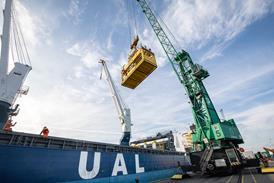The viability of electronic bills of lading (EBLs) is increasing at pace. Their implementation could have a number of benefits, including cost savings, better security, and a lower risk of fraud, all of which have intensified during the pandemic.
As part of the London International Shipping Week, global law firm Reed Smith hosted a panel of shipping industry experts to discuss the key challenges and opportunities facing the sector in a changing world. The first topic of discussion was EBLs, in particular the recent proposals by the UK Law Commission to reform English law regarding possession of trade documents.
Earlier this year, the commission announced a consultation on proposals to allow for the legal recognition of electronic versions of documents such as bills of lading and bills of exchange.
Panel moderator and Reed Smith shipping partner Nick Austin, said: “This could be a major step forward to achieving true electronic bills, especially given the prevalence of English law in shipping and trade contracts, and following hard on the heels of Singapore’s recent adoption of UNCITRAL’s Model Law. All this suggests we might finally be reaching a tipping point where trade documents truly become digital.”
The panellists were also in agreement that the law reforms were a positive step forward. According to Alexander Goulandris, co-founder and co-ceo of essDOCS, the UK law commission’s proposals to change the law would be massively impactful. “The UK is the largest maritime centre – at least in a legislative sense – in the world, it is a leader of maritime law and is looked at as a country that drives the direction of legislative change. A change in local law at UK level would have an enormous impact on supporting the proposals to push for EBLs on a global basis, it will undoubtedly make other commonwealth countries accelerate their work in this regard.”
While the proposals are a step in the right direction, there will still be obstacles to overcome, Goulandris considered. “We need a critical mass of countries to adopt to a point that the multipartite frameworks won’t be needed at all, but it is a really important step forward.”
The pandemic has also had an impact on the possible introduction of EBLs. In general, panellists agreed that the pandemic has forced the industry to begin to adopt new technologies at a faster pace; introduce hybrid working; and futureproof their businesses in the form of digitisation.
Goulandris believes that change is happening at a much faster pace. He said: “This time is very different and I think Covid is really the catalyst behind this. We now have a pandemic that’s been going on for over 18 months and seems to show no signs of ever dying out.
“Clearly this [pandemic] is something we are probably going to have to deal with forever. With that we have had habitual change, with people working from home for 18 months, there’s now massive discussions about hybrid working, and you cannot do hybrid working with a paper-based trade system. It’s just impossible.”
Birgitte Barfoed, senior vessel portfolio manager at A.P. Møller - Mærsk, added: “Shipping is a big industry and many documents exchange hands when cargo is transferred from A to B across the world. This last year and a half, we can also see from our customers, everyone has realised the need for a more digitised trade. Due to Covid, which has impacted many countries, customers, and carriers, we have definitely seen the difficulties of having paper bills.
“The events that have happened across the world have shown, both for carriers and customers, the need for more digitisation, and Maersk definitely thinks that, going forward, if you can make it more digitised it would hopefully reduce the risk of fraud.”
















